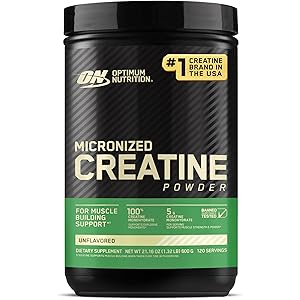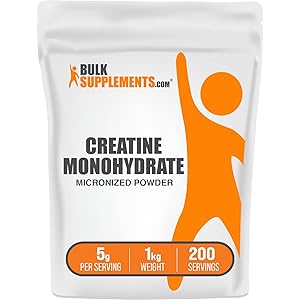Optimum Nutrition Micronized Creatine Monohydrate Powder, Unflavored, 120 Servings, 600 Grams (Packaging May Vary)
$27.96 (as of September 24, 2025 19:41 GMT +00:00 - More infoProduct prices and availability are accurate as of the date/time indicated and are subject to change. Any price and availability information displayed on [relevant Amazon Site(s), as applicable] at the time of purchase will apply to the purchase of this product.)Understanding Macronutrient Timing for Workouts
Macronutrient timing for workouts refers to the strategic consumption of carbohydrates, proteins, and fats around exercise sessions to optimize performance, recovery, and muscle growth. This approach emphasizes the importance of nutrient timing, which can significantly influence energy levels, muscle repair, and overall workout effectiveness. By understanding how to manipulate macronutrient intake before, during, and after workouts, individuals can enhance their training results and achieve their fitness goals more efficiently.
The Role of Carbohydrates in Macronutrient Timing
Carbohydrates are a primary source of energy for high-intensity workouts. Consuming carbs before exercise can help fuel performance, while post-workout carbohydrate intake is crucial for replenishing glycogen stores. The timing of carbohydrate consumption can vary based on workout intensity and duration. For instance, athletes engaging in prolonged endurance activities may benefit from consuming carbs both before and during their workouts, while those focusing on strength training might prioritize post-workout carbohydrate intake to support recovery.
Importance of Protein Timing for Muscle Repair
Protein plays a vital role in muscle repair and growth, making its timing essential in the context of macronutrient timing for workouts. Consuming protein shortly after exercise can enhance muscle protein synthesis, leading to better recovery and adaptation. Research suggests that a protein-rich meal or shake consumed within 30 minutes to two hours post-workout can maximize the benefits of resistance training. This timing is particularly important for individuals aiming to build muscle mass or improve strength.
Fats and Their Role in Macronutrient Timing
While fats are often seen as a secondary source of energy during workouts, they still play an essential role in overall nutrition. Timing fat intake can be less critical than carbohydrates and proteins, but it is important to consider the type of fats consumed. Healthy fats, such as those from avocados, nuts, and olive oil, can support overall health and provide sustained energy. However, it is generally advisable to limit fat intake immediately before workouts, as high-fat meals can slow digestion and potentially hinder performance.
Pre-Workout Nutrition Strategies
Effective pre-workout nutrition is crucial for maximizing performance. A well-balanced meal containing carbohydrates and protein consumed about 1-3 hours before exercise can provide the necessary energy and amino acids for optimal performance. For those with less time, a quick snack rich in carbs and moderate in protein can be beneficial. Additionally, hydration should not be overlooked; ensuring adequate fluid intake before workouts can enhance endurance and prevent fatigue.
Intra-Workout Nutrition: When and What to Consume
Intra-workout nutrition is particularly relevant for those engaging in prolonged or intense training sessions. Consuming easily digestible carbohydrates during workouts can help maintain energy levels and delay fatigue. Sports drinks, gels, or chews can be effective options for quick energy replenishment. Additionally, some athletes may choose to include branched-chain amino acids (BCAAs) to support muscle preservation during extended workouts, especially in a fasted state.
Post-Workout Recovery and Macronutrient Timing
The post-workout period is critical for recovery, and proper macronutrient timing can significantly impact results. A combination of carbohydrates and protein consumed within the recovery window can enhance glycogen replenishment and muscle repair. Aim for a ratio of approximately 3:1 or 4:1 carbohydrates to protein, depending on the intensity of the workout. This strategic intake helps to optimize recovery, reduce muscle soreness, and prepare the body for subsequent training sessions.
Individual Variability in Macronutrient Timing
It’s important to recognize that macronutrient timing for workouts is not a one-size-fits-all approach. Individual factors such as body composition, workout goals, and metabolic rate can influence how one should time their macronutrient intake. Athletes and fitness enthusiasts should experiment with different timing strategies to find what works best for their unique needs and preferences. Consulting with a nutritionist or dietitian can also provide personalized guidance based on specific goals.
Common Mistakes in Macronutrient Timing
Many individuals make common mistakes when it comes to macronutrient timing for workouts. Skipping pre-workout meals, neglecting post-workout nutrition, or consuming the wrong types of foods can hinder performance and recovery. Additionally, some may overemphasize one macronutrient at the expense of others, leading to imbalances that can affect overall health and fitness progress. Awareness of these pitfalls can help individuals make more informed choices regarding their nutrition around workouts.
Conclusion: The Importance of Macronutrient Timing
Incorporating macronutrient timing into workout routines can significantly enhance performance, recovery, and overall fitness results. By understanding the roles of carbohydrates, proteins, and fats, individuals can make informed decisions about their nutrition before, during, and after exercise. Tailoring macronutrient intake to personal goals and training demands is essential for achieving optimal results in any fitness journey.


